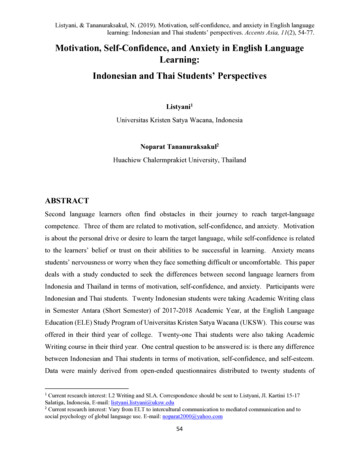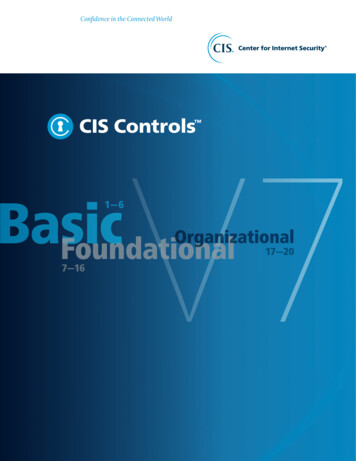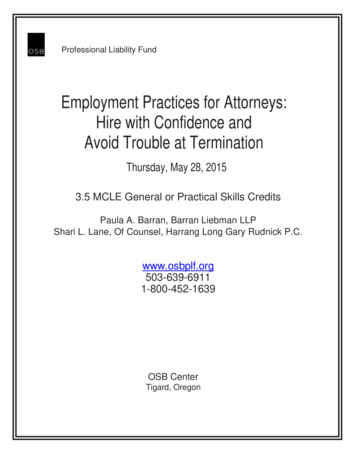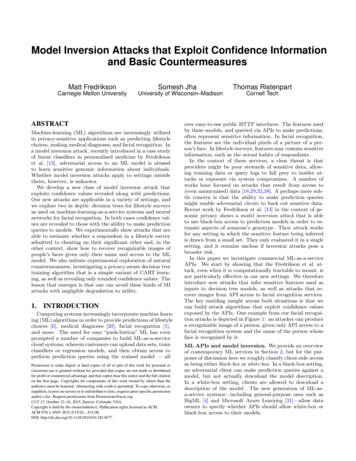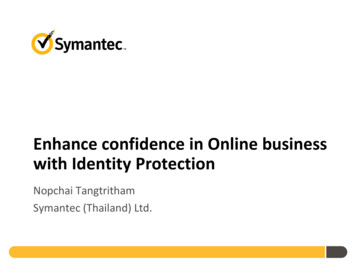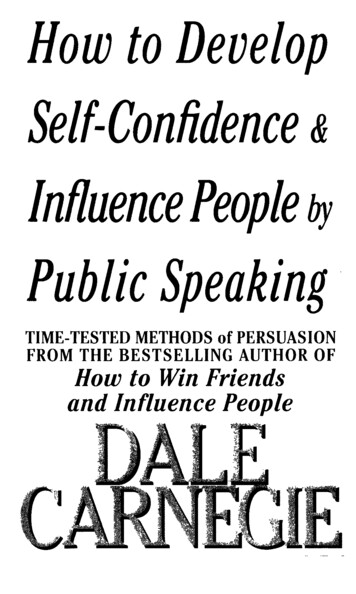
Transcription
How to DevelopSelf-Confidence &Influence People byPublic Speaking
LOOK FORTHE LEADER IN YOUHow to Win Friends, Influence People,and Succeed in a Changing WorldBy DALE CARNEGIE &ASSOCIATES, INC.Stuart R. Levine, CEO,& Michael A. Crom, VPAND DON'T MISS THESEBESTSELLERS BY DALE CARNEGIE: HOW TO DEVELOP SELFCONFIDENCE AND INFLUENCEPEOPLE BY PUBLIC SPEAKING HOW TO ENJOY YOUR LIFE ANDYOUR JOB HOW TO STOP WORRYING ANDSTART LIVING HOW TO WIN FRIENDS ANDINFLUENCE PEOPLE(Revised Edition)THE QUICK AND EASY WAY TOEFFECTIVE SPEAKING · o""" ---;;""[0 EANALL AVAILABLE FROM POCKET BOOKS
Your life can be easier .more exciting . .more rewarding!"Is there the faintest shadow of a reason why youshould not be able to think as well in a perpendicular position before an audience a3 you canwhen sitting down'? Surely, you know there isnot. In fact, you ought to think better when facinga group. Their presence ought to stir and lift you.A great many speakers will tell you that thepresence of an audience is a 3t mulus, an in3piratl0n, that drives their brains to functionmon clearly, more keenly."-DaleCamc ieHere is a book for men and women who wantto gel ahead. As the author dernonstrdt :R or. ( v('rypage, l a" techniques that can pu.t you over ""ithan audience can help you in every phase of y .mrlife.
Books by Dale CarnegieHow to Develop Self-Confidence and Influence Peopleby Public SpeakingHow to Enjoy Your Life and Your Job (Revised Edition)How to Stop Worrying and Start LivingHow to Win Friends and Influence People (Revised Edition)The Quick and Easy Way to Effective SpeakingBy Dale Carnegie & Associates, Inc.The Leader in YouPublished by POCKET BOOKSFor infonnation regarding special discounts for bulk purchases,please contact Simon & Schuster Special Sales at1-800-456-6798 or business@simonandschuster.com
How to DevelopSelf-Confidence andInfluence People byPublicSpeakingby DALE CARNEGIESelected andcondensed by Dorothy Carnegie fromPYBUC SPEAKING AND INFLUENCINGMEN IN BUSINESS by Dale CarnegiePOCKET BOOKSNew YorkLondonTorontoSydney
The sale of this book without its cover is unauthorized. If you purchasedthis book without a cover, you should be aware that it was reported tothe publisher as "unsold and destroyed." Neither the author nor thepublisher has received payment for the sale of this "stripped book."POCKET BOOKS, a division of Simon & Schuster, Inc.1230 Avenue of the Americas, New York, NY 10020Copyright 1926, 1937, 1955, 1956 bythe National Board of Young Men's Christian AssociationsAll rights reserved, including the right to reproducethis hook or portions thereof in any form whatsoever.For information address the National Boardof Young Men's Christian Associations.291 Broadway, New York, NY 10005ISBN 13: 978-0-671-74607-0ISBN 10:0-671-74607-3First Pocket Books printing December 195671 70 69 68 67 66 65 64 63 62POCKET and colophon are registered trademarks ofSimon & Schuster, Inc.Printed in the U.S.A.
IntroductionFor many years, Dale Carnegie's name has beensynonymous with winning friends and influencing people.How to Win Friends and influence People is one of the bestsellers of all time in nonfiction and has brought him international popularity. But How to Win Friends and influencePeople was not the first book written by Dale Carnegie.In 1926, Dale Carnegie wrole a book entitled PublicSpeaking and Influencing Men in Business. This was a textbook on public speaking, and, up to the present date, hasbeen one of the official textbooks of the world-famous DaleCarnegie Course in Effective Speaking and Human Relations. II has also served as a textbook for Y.M.C.A. publicspeaking classes. Tills book has sold 600,000 copies in thelast ten years alone, and the total sale of the hard-coveredition is now over 1,000,000 copies. It has been publishedin some twenty languages and thousands of copies havebeen sold in these foreign eclitions. It has not, however,been a book of which the majority of the reading publichas been aware.Some time ago, the publisher, Association Press, approached me with the idea that this earliest of my latehusband's books might have popular appeal if edited andpublished as a Pocket Book. They felt, as I do, that thisbook contained many valuable ideas for everyday living.The Dale Carnegie Course has now spread its pilllosophythroughout the world and has reached a total of over1,000,000 graduates. The course helps people to achieve amore courageous, happier and more fruitful life, by bringingout the latent qualities they possess.This Pocket Book, How to Develop Self-Confidence andinfluence People by Public Speaking, has been edited to appeal to the "reading" public. It contains many of the words
viINTRODUCTIONof wisdom that have helped our students to achieve theirgoals. In re-reading the book carefully in the past fewmonths, I realize how many wise rules it contains for overcoming fear and gaining self-confidence. Practical techniques and suggestions are added to those rules that willhelp everyone to meet people as individuals or as groups,and to talk with them effectively.I do hope new readers will gain as much from this bookas have the students of the Dale Carnegie Course in thepast thirty years.-DoROTHY CARNEGIE
ContentsChapterPage1.Developing Courage and Self-Confidence12.Self-Confidence Through Preparation173.How Famous Speakers Prepared Their Addresses374. The Improvement of Memory575.79Essential Elements in Successful Speaking6. The Secret of Good Delivery917.Platform Presence and Personality1098.How to Open a Talk1299.How to Close a Talk149How to Make Your Meaning Clear16510.11. How to Interest Your Audience18312.Improving Your Diction199Appendix: Speech Building with Exercises221
How to DevelopSelf-Confidence andInfluence People byPublicSpeaking
CHAPTER ONEDeveloping Courageand Self-ConfidenceMore than five hundred thousand men andwomen, since 1912, have been members of public speakingcourses using my methods. Many of them have writtenstatements telling why they enrolled for this training andwhat they hoped to obtain from it. Naurally, the phraseologyvaried; but the central desire in these letters, the basic wantin the vast majority, remained surprisingly the same:"When 1 am called upon to stand up and speak," personafter person wrote, "1 become so self-conscious, so frightened, that I can't think clearly, can't concentrate, can't remember what 1 had intended to say. I want to gain selfconfidence, poise, and the ability to think on my feet. Iwant to get my thoughts together in logical order and I wantto be able to say my say clearly and convincingly before abusiness or club group or audience." Thousands of theirconfessions sounded about like that.To cite a concrete case: Years ago, a gentleman herecalled Mr. D. W. Ghent, joined my public speaking coursein Philadelphia. Shortly after the opening session, he invited me to lunch with him in the Manufacturers' Club.
2HOW TO DEVELOP SELF-CONFIDENCEHe was a man of middle age and had always led an activelife; was head of his own manufacturing establishment, aleader in church work and civic activities. While we werehaving lunch that day, he leaned across the table and said:"1 have been asked many times to talk before variousgatherings, but I have never been able to do so. I get sofussed, my mind becomes an uttcr blank: so I have sidestepped it all my life. But I am chairman now of a boardof college trustees. 1 must preside at their meetings. I simplyhave to do some talking. 00 you think it will be possible for me to learn to speak at this late date in my life?""Do 1 think, Mr. Ghent?" 1 replied. "It is not a questionof my thinking. I know you can, and J know you will if youwill only practice and follow the directions and instructions."He wanted to believe that, but it seemed too rosy, toooptimistic. "1 am afraid you are just being kind," heanswered, "that you are merely trying to encourage me."After he had completed his training, we lost touch witheach other for a while. Later, we met and lunched togetheragain at the Manufacturers' Club. We sat in the samecorner and occupied the same table that we had had on thefirst occasion. Reminding him of our former conversation,J asked him if I had been too sanguine then. He took alittle red-backed notebook out of his pocket and showed mea list of talks and dates for which he was booked. "Andthe ability to make these," he confessed, "the pleasure I getin doing it, the additional service I can render to the community-these are among the most gratifying things in mylife."An important disarmament conference had been held inWashington shortly before that. When it was known thatthe British Prime Minister was planning to attend it, theBaptists of Philadelphia cabled, inviting him to speak at agreat mass meeting to be held in their city. And Mr. Ghentinformed me that he himself had been chosen, from amongall the Baptists of that city, to introduce England's premierto the audience.And this was the man who had sat at that same table less
Developing Courage and Self-Confidence3than three years before and solemnly asked me if I thoughthe would ever be able to talk in publiclWas the rapidity with which he forged ahead in hisspeaking ability unusual? Not at alL There have beenhundreds of similar cases. For examp1.e--to quote one morespecific instance-years ago a Brooklyn physician, whomwe will call Dr. Curtis. spent the winter in Florida near thetraining grounds of the Giants. Being an enthusiastic baseball fan, he often went to see them practice. In time hebecame quite friendly with the te and was invited toattend a banquet given in their honor.After the coffee and nuts were serve several prominentguests were called upon to "say a few words." Suddenly,with the abruptness and unexpectedness of an explosion heheard the toastmaster remark: "We have a physician with usto-night, and I am going to ask Dr. Curtis to talk on a Baseb-al1 Players Health."Was he prepared? Of course. He had had the best preparation in the world: he had been studying hygiene andpracticing medicine for almost a third of a century. Hecould have sat in his chair and talked about this subject allnight to the man seated on his right or left. But to get upand say the same things to even a small audience-that wasanother matter. That was a paralyzing matter. His heartdoubled its pace and skipped beats at the very contemplation of it. He had never made a public speech in his life,and every thought that he had had now took wings.What was he to do? The audience was applauding.Everyone was looking at him. He shook his head. But thatserved only to heighten the applause, to increase the demaad. The cries of "Dr. Curtisl Speechl Speechl" grewlouder and more insistent.He was in positive misery. He knew that if he got up hewould fail, that he would be unable to utter half a dozensentences. So he arose, and, without saying a word, turnedhis back on his friends and walked silently out of the room,a deeply embarrassed and humiliated man.Small wonder that one of the first things he did after getting back to Brooklyn was to enroll in my course in Public
4HOW TO DEVELOP SELF-CONFIDENCESpeaking. He didn't propose to be put to the blush and bestricken dumb a second time.He was the kind of student that delights an instructor: hewas in dead earnest. He wanted to be able to talk, and therewas no halfheartedness about his desire. He prepared histalks thorougWy, he practiced them with a will, and henever missed a single session of the course.He did precisely what such a student always does: heprogressed at a rate that surprised him, that surpassed hisfondest hopes. After the first few sessions his nervousnesssubsided, his confidence mounted higher and higher. In twomonths he had become the star speaker of the group. Hewas soon accepting invitations to speak elsewhere; he nowloved the feel and exhilaration of it, the distinction andthe additional friends it brought him.A member of the New York City Republican CampaignCommittee, hearing one of his public addresses, invited Dr.Curtis to stump the city for his party. How surprised thatpolitician would have been had he realized that only a yearbefore, the speaker had gotten up and left a public banquethall in shame and confusion because he was tongue-tiedwith audience-fear!The gaining of self-confidence and courage, and theability to think calmly and clearly while talking to a groupis not one-tenth as difficult as most people imagine. It is nota gift bestowed by Providence on only a few rarely endowedindividuals. It is like the ability to play golf. Anyone candevelop his own latent capacity if he has sufficient desire todo so.Is there the faintest shadow of a reason why you shouldnot be able to think as well in a perpendicular positionbefore an audience as you can when sitting down? Surely,you know there is not. In fact, you ought to think betterwhen facing a group. Their presence ought to stir you andlift you. A great many speakers will tell you that the presence of an audience is a stimulus, an inspiration, that drivestheir brains to function more clearly, more keenly. At suchtimes, thoughts, facts, ideas that they did not know theypossessed, "drift smoking by," as Henry Ward Beechersaid; and they have but to reach out and lay their hands
Developing Courage and Self-Confidence5hot upon them. That ought to be your experience. It probably will be if you practice and persevere.Of this much, however, you may be absolutely sure:training and practice will wear away your audience-frightand give you self-confidence and an abiding courage.Do not imagine that your case is unusually difficult. Eventhose who afterward became the most eloquent representatives of their generation were, at the outset of their careers,afBicted by this blinding fear and self-consciousness.William Jennings Bryan, battle-marked veteran that hewas, admitted that in his first attempts, his knees fairlysmote together.Ma
How to Win Friends and influence People is one of the best sellers of all time in nonfiction and has brought him interna tional popularity. But How to Win Friends and influence People was not the first book written by Dale Carnegie. In 1926, Dale Carnegie wrole a book entitled Public Speaking and Influencing Men in Business. This was a text book on public speaking, and, up to the present .

